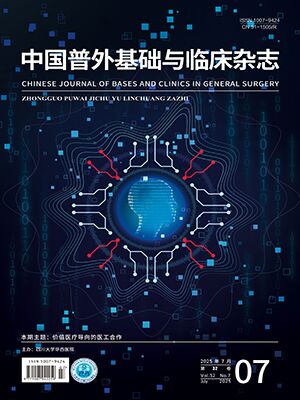| 1. |
汪晓东, 李立. 数据库建设第一部分: 个人数据的标签与结构化. 中国普外基础与临床杂志, 2019, 26(3): 335-342.
|
| 2. |
汪晓东, 吕炘沂, 黄明君, 等. 数据库建设第二部分: 结直肠癌住院流程管理的标签与结构化. 中国普外基础与临床杂志, 2019, 26(7): 852-855.
|
| 3. |
Sung H, Ferlay J, Siegel RL, et al. Global cancer statistics 2020: GLOBOCAN estimates of incidence and mortality worldwide for 36 cancers in 185 countries. CA Cancer J Clin, 2021, 71(3): 209-249.
|
| 4. |
Chen H, Li N, Ren J, et al. Participation and yield of a population-based colorectal cancer screening programme in China. Gut, 2019, 68(8): 1450-1457.
|
| 5. |
左锐, 李文桓, 朱声荣, 等. 医院诊疗服务信息化建设与相关问题探讨. 医院管理论坛, 2023, 40(2): 81-84.
|
| 6. |
郑道洪. 以患者为中心重塑医疗信息系统流程. 2022中国医学装备大会论文集. 2022: 421-425.
|
| 7. |
Kehlet H. Multimodal approach to control postoperative pathophysiology and rehabilitation. Br J Anaesth, 1997, 78(5): 606-617.
|
| 8. |
Zhu AC, Agarwala A, Bao X. Perioperative fluid management in the enhanced recovery after surgery (ERAS) pathway. Clin Colon Rectal Surg, 2019, 32(2): 114-120.
|
| 9. |
Pawa N, Cathcart PL, Arulampalam TH, et al. Enhanced recovery program following colorectal resection in the elderly patient. World J Surg, 2012, 36(2): 415-423.
|
| 10. |
赵伟伟, 杨路路, 石亚然, 等. 医护一体化快速康复外科护理在结直肠癌手术病人中的应用. 护理研究, 2023, 37(24): 4531-4534.
|
| 11. |
中华医学会外科学分会, 中华医学会麻醉学分会. 加速康复外科中国专家共识及路径管理指南 (2018版). 中国实用外科杂志, 2018, 38(1): 1-20.
|
| 12. |
Greco M, Capretti G, Beretta L, et al. Enhanced recovery program in colorectal surgery: a meta-analysis of randomized controlled trials. World J Surg, 2014, 38(6): 1531-1541.
|
| 13. |
Cavallaro P, Bordeianou L. Implementation of an ERAS pathway in colorectal surgery. Clin Colon Rectal Surg, 2019, 32(2): 102-108.
|
| 14. |
Sun YM, Wang Y, Mao YX, et al. The safety and feasibility of enhanced recovery after surgery in patients undergoing pancreaticoduodenectomy: an updated meta-analysis. Biomed Res Int, 2020, 2020: 7401276.
|
| 15. |
朱斌, 黄建宏. 加速康复外科在我国发展现状、挑战与对策. 中国实用外科杂志, 2017, 37(1): 26-29.
|
| 16. |
车国卫, 刘伦旭, 石应康. 加速康复外科临床应用现状与思考. 中国胸心血管外科临床杂志, 2016, 23(3): 211-215.
|
| 17. |
吴成威, 孙博实, 迟强. ERAS理念在结直肠癌治疗中的应用. 中华结直肠疾病电子杂志, 2018, 7(1): 21-25.
|
| 18. |
谢莉萍, 彭慧, 黄南祺, 等. 结直肠癌及其筛查认知情况、筛查意愿与文化程度相关性的调查分析. 中华普通外科学文献 (电子版), 2013, 7(3): 231-234.
|
| 19. |
邓豪. 结直肠癌患者辅助化疗依从性及影响因素分析. 南华大学, 2021.
|
| 20. |
张超, 范汉同. 文化程度对首发精神分裂症患者治疗依从性及生存质量的影响. 临床心身疾病杂志, 2021, 27(4): 139-141.
|
| 21. |
祁林青, 杨娟, 张莉莉. 文化程度对髌骨骨折患者术后功能锻炼认知与依从性的影响. 长春中医药大学学报, 2020, 36(6): 1265-1268.
|
| 22. |
Maessen JM, Dejong CH, Kessels AG, et al. Length of stay: an inappropriate readout of the success of enhanced recovery programs. World J Surg, 2008, 32(6): 971-975.
|




